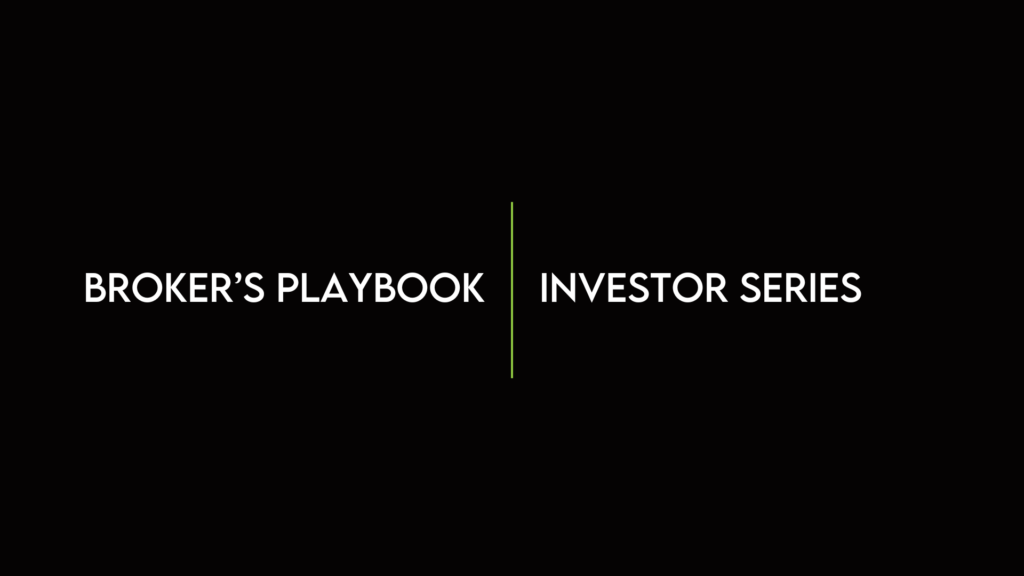Welcome to Brokers Playbook! On today’s episode, we have Ryan Coyle, the founder and CEO of Connect – one of the biggest players in pre-construction real estate. We’re talking about what it takes to succeed in this industry and how Ryan has managed to reach such high demand. Don’t miss out on this important lesson in real estate investment and tune into this episode for insight you won’t find anywhere else! Join us now for an exclusive interview with Ryan and get ready to take your real estate game to the next level.
Simeon Papailias: Hello once again to my entire Broker’s Playbook nation. This is Simeon, Papailias. And today I am bringing you some serious insight from one of the biggest players in the pre-construction world and of course, the entire real estate investment focus route in business. It’s none other than Ryan Coyle, founder and CEO of Connect. Stay tuned. Welcome everybody to Brokers Playbook. Today I have Ryan Coyle joining me. As you may have heard, this is one of the most serious players in the pre-construction and investment focused real estate game. Ryan, welcome to the show, my brother.
Ryan Coyle: Thanks for having me back.
Simeon Papailias: It’s my pleasure to have you back. And I have big plans for today as to the type of questions I have for you. The last time we spoke, I was in the beginning of Covid and at the time, our brothers and sisters in the business just like us. We’re just trying to figure it out. Nobody knew what was going to go down. Turns out it was the biggest windfall in real estate history on record. Who would have.
Ryan Coyle: Thought? Who would.
Simeon Papailias: Have thought that 2021 would turn out to be the biggest Canadian real estate year of all.
Ryan Coyle: Time? Yeah.
Simeon Papailias: It’s nuts. Um, cut the long story short, party came to an end. The music stopped February of 2022, and for the last 18 months, just over just about 20 months. We have.
Ryan Coyle: As it always does.
Simeon Papailias: As it always.
Ryan Coyle: Does. Party always ends. Then you go to the next party and then you go.
Simeon Papailias: To the next party. But in the last 20 months, going on two years here in the spring. We have seen a massive shift. We have seen many, many brokers not only out of their comfort zone, but hurt and or out of the business completely. Whether they were new or whether they were part timers, whether they missed the mark in building their business when they should have. The bottom line is there’s a whole lot of. Suffering out there and it’s not that necessary to be there. Our businesses have contracted. Sure. As a result of 50% less volume. But we’re still overperforming the average. My business is not down 50%, right? It’s probably down 1520. Yeah, depending on the month 25. But we’re still working our backs off. We’re still performing and still creating deals using investment real estate as the route.
Ryan Coyle: Yeah. Yeah. You got to reinvent yourself a little bit in this market. You have to shift. Yeah, you have to shift. Pivot. Yeah.
Simeon Papailias: You specifically, I’ve looked up to since I’ve known you. We’ve known each other for a decade, and we’ve been competitors for a decade our entire lives, not knowing the incredible parallels that we have in business. Like when we became closer and kind of looked under the hood of each other’s vehicles. Yeah, we saw like kind of a reflection of ourselves, which which was crazy. Yeah. Because we’re not that common. But I believe we can be far more common without hurting ourselves, meaning to collaborate like we have in what we’re working on together, which I’m excited about. I think these are transferable skills that we’ve developed that can help the entire industry move forward. Can you please touch a little bit on the thesis, the fundamental thesis of your business? Where do you you wake up? What is it? How do you look at real estate? How do you identify opportunity?
Ryan Coyle: Yeah for sure. Well, I mean, like you said, it’s it’s, you know, there’s there’s a party and the party ends and then there’s another party. But you know, throughout those, those parties or those cycles or whatever you want to call it, you need to really, you know, kind of hone in on your skills and try to reinvent yourself sometimes. Um, you know, I’ve, I’ve been doing this long enough that I’ve created, created a very clear vision for myself and my company and my business. But, you know, within that vision, you need to re identify yourself every now and then and reinvent yourself. So, um, you know what I kind of took out of all of this is, you know, we used to meet people face to face and that completely fell off a cliff. And then everything was being done virtually. So we pivoted and we said, you know, how can we make this buying experience, this customer experience, you know, valuable? And we took the in-person approach that we experienced before Covid, and we turned that into, you know, virtual meets where we would walk them through projects and we’d walk them through opportunities. And, you know, going back to my core vision and what I look forward to every day is, is, you know, our identity is to create, to take an investment advisor approach to selling real estate. So, you know, we want to look at how do we differentiate ourselves, how do we create value. And every day I go into the office and I meet with my marketing team or my sales team. We talk about those differentiators, you know, again, the investment advisor approach to selling real estate. So when I’m looking at an opportunity for my clients, I’m not creating a brochure like campaign that gets people excited about a park next to a condo building or all of these great amenities in this lifestyle. I’m looking at the data. I’m teaching my team how to look at the data, and then we’re talking to our audience, our consumers with the data, and we’re offering value that way. So, um.
Simeon Papailias: But it’s not exactly it’s not like you just throw a bunch of stats and graphs out there. You have probably the highest skill that I have seen. And I’m not saying this to pump your tires. I actually mean it. I haven’t seen anybody break down stats in a way that it makes it resonate. It actually highlights a way for the consumer who is a teacher, a kindergarten teacher, to understand the investment. Right? Because we know that the the common profile of real estate investors, they’re either new to real estate investing or they’re if they’re repeating they still don’t have your trajectory of knowledge. It’s impossible. We live it every day so we can speak in we talk industry terms by accident. Sometimes your emails the way you present data is different. How can another agent understand that logic of how you break down the employment node and how that impacts the investment? Yeah. How does one do that?
Ryan Coyle: Well, I mean, when I started becoming a little bit successful in real estate, I just completely went. You know, nose deep in information. I learned how to market. I learned how to. I read every single book you could read on how to read, how to write sales copy, psychologically stimulating sales copy, short form sentences. I wouldn’t bore the audience with, you know, long paragraphs. So I kind of learned the psychology of selling and then the psychology of copywriting, which sounds really, really boring, but it’s.
Simeon Papailias: Extremely effective.
Ryan Coyle: It’s extremely effective. So I put a lot of information in an email. And that’s what we’re really good at, the data I talked about. But you’re right, I don’t put a really long email with a lot of data. Long data, I break it down into points and really on the the factors that I think will pull at the heartstrings of buyers and investors. So that’s kind of, you know, there’s nothing there’s no rocket science to it. I just really wanted to learn how to write effective emails, because for me, the majority of my business was being done through email.
Simeon Papailias: And what I will do is I am going to have you hopefully commit to your first deliverable here, and that is for anybody in the audience who is looking to understand what I’m referring to. If you haven’t seen one of Connect’s emails, one of Ryan’s emails, I ask you to simply shoot us a DM on any social platform or send us an email to community@wordpress-1168150-4082689.cloudwaysapps.com, because we will share a library of 2 to 3 emails from maybe the last three years where different markets, different points and always effective, always driving sales.
Ryan Coyle: Well, that’s an important point. I mean, look what I’m doing. I’m not the only one doing it. No, I probably was one of the first people to really take very data driven emails and make them more digestible and salesy and, you know, kind of break up the copy and make visuals to support it, which I think is really important to to keep people engaged and interested in reading an email. But, I mean, Broker’s Playbook is a perfect example of you guys doing the exact same thing and actually providing it to the realtor so they can be that expert. Yeah.
Simeon Papailias: So I think that’s the the huge component, because what we strive to do, what this podcast is for, is to open the eyes to an agent to add another vertical to their business, one they may have not necessarily been in, or if they have been in what the only scalable component of real estate, which is new construction. Everything else is subjective, right? New construction. The reason me, I was in it. The reason you’re in it is because you can do 30 deals on a Saturday. Yeah, because they don’t have to look at it. It’s it’s standard. It’s real. It’s brand new objective. Yeah. All of the real estate subjective. It has to be down your alley. It has to.
Ryan Coyle: Work. You could drive around for a week or a month or six months with a buyer to get that one sale. I remember my first open house in Pre-con. I did five deals in one day. I’m like, this would have taken me six months in resell.
Simeon Papailias: So so the point of the exercise and that’s why I said we’re working on something very special in the background. Hopefully we can announce it in the next few months, but it’s a massive collaboration. Uh, I’ll let maybe a hint it’s a massive collaboration education component and access component. How do you access this? And I’m talking about Toronto because our listeners are in South Carolina, Florida, Arizona, Vancouver. So how do you access opportunity to create this vertical in your business in your local market?
Ryan Coyle: Yeah, I mean, look, that’s that’s a big question. And for me, the route I took was to go nose deep into every book I could read on marketing sales. And then I had to learn how to get access. I had to fight to get access to all these developments. So I had to become an expert. I had to then get access. Then I had to build a database. It was a lot of work. And, you know, what we’re talking about is something where this is all kind of A to Z provided for agents. There is a company I started probably about 7 or 8 years ago, maybe closer to 10 years ago when I was very active, just starting Pre-con about ten years, taking the investment advisor approach to selling real estate. We had investor reports, financial proformas someone would register on my landing page, they’d get an A to Z, all these emails that would drive everyone to an event or to buy a condo ultimately. And I was getting sorry. I was getting other agents copying all of our content all the time, literally just copying and pasting. So we were constantly sending season cease letters. And finally we’re like, you know what? Why are we fighting all of this? Why don’t we think of a better way of doing it and give agents access to our marketing campaign? And then I could go to a developer, say, look, I’ve got an army of agents. It’s not just me and my partner I’ve got. An army of agents. I’ve got all this marketing. I’m going to drive a thousand people. Hundreds of agents and their clients to a one day event and help sell your entire building. And. And that was how Insider condo club was born. You know, very similar to what Brokers Playbook is doing today. And that created incredible value for me, but also for my community, which was was exceptional. Um, you know, now now, you know, we’re working on something similar, which is really exciting. But yeah, I mean, I think that’s really the key piece. You don’t have to do it on your own anymore.
Simeon Papailias: I actually think it’s become increasingly difficult to do things on your own. The business has shifted from a demand in in exposure, meaning people are no longer going to seminars on a Tuesday night. They live on their phones. They expect the delivery of of the value proposition and the data instantly in their inbox or in their socials. So that whole disconnect now and shift that happened from the old school to the iPhone nine, let’s say. Let’s talk in years by iPhone version. When technology and zoom and all these delivery mechanisms have changed the way we do business. Yeah, for sure, because it’s not ancient history. In 07 06, when I was licensed, fax was the delivery method of an offer. Yeah. That’s not ancient history. Yeah. We’re not talking 70s or 80s or 90s.
Ryan Coyle: I tried that once for an event. I was sending faxes.
Simeon Papailias: Oh seven. I remember in 2012, we were using a fax to get packages out of a Niagara Falls investment summit back to Toronto. Yeah. And it was just that that’s when scanning became only 800. There were smaller files, so it was easy to. So this is not, you know, 20 or 30 years ago that we’re talking about. Yeah. But over the last decade everything has changed. Yeah. So for an agent to have a successful resale practice because you need to get paid. Yeah. They’re working. They have clients. They’re on the road to add a vertical like pre-construction, which they would demand them to be in networking events, appeasing builders and developers by supporting them and all the things that you and I know all too well. Yeah. Is a whole entire other life. Yeah. I’m able to do it because I have a business partner at the office shoving deals into the community every single day. We have a massive database to do.
Ryan Coyle: I used to have that.
Simeon Papailias: Yes you did.
Ryan Coyle: I’m doing it all. It’s really tiring.
Simeon Papailias: Well, well, you haven’t aged one bit, Ryan. No, but like these teams, these mega teams that we’ve accumulated over time. And I’m not saying this for nothing is I have a full time, not a full time, 60 hour a week director of operations running to kind of his capacity with assistants running at their capacity to make this all function. It’s not easy. What we are working on to, to create is that access that wholesome done for you machine. Right where we have third party out, the creation of packages of scripts of all the best practices that we’ve created over time that can be implemented into any project. Save and accept the nuances of each project. That is a huge value add in my opinion, and possibly the only way that somebody can meaningfully plug into this world without either going enduring the cost commitment or the time commitment that it takes to build it.
Ryan Coyle: I mean, look, I’d be five years further than I am right now had that been available when I started.
Simeon Papailias: What do you mean? Tell me what that means to you.
Ryan Coyle: Well, I mean, look. So. So again, I had to become an expert all on my own. It was very lonely. It was a lot of work. I became really good at the emails again. But getting access was very challenging. So. So what I mean by that is that for me to be able to have something like that out of the box and be able to leverage a community or whatever someone else has created, I think is advantageous. I’ve obviously had a tremendous amount of success. I’m very blessed with the success I’ve had. It wasn’t that easy at the beginning, especially. And then the interesting thing about pre-construction, which is very lucrative, everyone likes to hire commissions, which they are, but they get paid out over a long period of time in order to be successful. It costs a lot of money today. Upfront today. So if I want to go do a, you know, a kick ass event, get 500 people out there, it’s going to cost me 50, 60 grand to do that.
Simeon Papailias: Let’s break it. Stop. Let’s break it down. And I’ll tell you why. Because people don’t know what you’re talking about, right? I know because of the intricacies of our local market. Yeah. So pre-construction. So we’re talking about new construction, typically high rise real estate. Yeah. The developer has to launch the project today to show the bank that this project can be actually completed and sold. They have to sell 70% of a building. Yeah. They approach the platinum community. This is our local market, which is guys like me, yourself, some of our amazing colleagues in the business and say, hey guys, I’m looking for your support. I need you to sell 20 units. I need you to sell 30 units, you 50 units, whatever the case may be. The first thing we need to do is take back the information. Run to the office. Create landing pages. Pay per click campaigns. Meta campaigns. Youtube campaigns, shoot videos, create ads, hit our magazines, start creating audiences, and start creating a buzz. When you have 100 top brokers in a market like Toronto doing it all at the same time, you create a tsunami of activity online. It’s a good thing in order to get clients. Awareness creates.
Ryan Coyle: A buzz.
Simeon Papailias: It’s a bad thing because we’re all competing for the same keywords. Yeah, which drives campaigns. So a campaign like what I just mentioned, and this is why we’re saying it’s not easy to do on your own, and it’s not to intimidate you, but it’s real and any of you can look into it. You’re looking at costs starting at 25 to 30 grand for a campaign that the credit card gets beat up on a daily basis for the next 30 days. Yeah. So the money that you’re going to earn is going to be earned over the next call it 180 days to four years in separate payments, big commissions. We’re talking about big money. But the investment for you to do it is significant and substantial. Yeah. And in many cases crippling because it doesn’t allow you to get started. Yeah. What we’re working on and what you’ve been doing and what I’ve been doing separately over the past and hopefully now in unison, is providing that access is providing the strategies to get it done. What would you what is your number one tip right now, or what are you leading your sales force with when you have a team meeting? What is the psychology and the culture like in the room?
Ryan Coyle: Well, I mean, right now in this market, it’s trying to keep everyone motivated and excited about the market. But, you know, it’s really focusing on the right opportunity. So like you said, you go meet with the developers, the teams you get, you know, the lunches, the dinners, and then you got to run back with all the information to the office, share with the marketing team, share it with the sales team. You’re most likely doing two or 3 or 4 other projects, because to get access to project one, you got to be supporting on project two, three, four, or five. So it’s a tremendous amount of work, but it’s, you know, trying to kind of focus where will we spend the ad budget? Where are we, where will we put the ad budget? And then creating the scripts and getting the sales team, you know, getting them, you know, aligned with the right project, so on and so forth.
Simeon Papailias: Tips for your sales agents. Have the scripts changed? Have you? How are you dealing with the objections from clients? I know what our top objections are. This thing is they’re going to speak to cash flow negative. They’re going to speak to the high interest environment that’s been plaguing us for the last two years. Yeah. How do you get around that? What is your mortgage buster script?
Ryan Coyle: Sure. Well, I mean, it’s the data. So it’s knowing the data. CMHC released a report talking about the shortage of housing that they’re expecting in 2030. So what does that suggest? You know, there’s a supply and demand story. That’s the supply side CMHC also came out with. The report suggests that home values are expected to appreciate as high as 98% by 2030. 98.98%. So if all housing policy, all supply policy, all immigration demand policy, let’s call it, because you’ve got two sides remain the same. They’re they’re they’re suggesting that pricing or forecasting I should say pricing will be that much higher in 2030. So you know, that’s the data we look for. That’s the information we arm ourselves with because there’s objections. So you want to be able to be like okay well right. No one wants to buy right now. But let’s not focus on today. Let’s focus on the future. What does the future look like? And having the data kind of paints that picture.
Simeon Papailias: How do you address speculation versus. Wise breakdown of data. At which point does hoping stop? Like so. So what you don’t want to do is be an optimist and look at data from an optimistic perspective. You don’t want to be a pessimist because that’s how opportunity is lost. But this is also where you get burnt. So getting burnt. How do you find that middle ground of proper analysis and guidance of your clients when you are, as a sales person, motivated to sell because you need to earn a living? Sure. How do you break down? Because I’m not going to talk about an ethical dilemma because I don’t have one. And it was a fact that you don’t have one followed you long enough. To the agent that is not so advanced in their career, and they have to make that decision of how to paint an investment. Is always being realistic. The way to do it. Do you lose sales as a result of it? How do you balance that ethical sales? Choice, I guess. The choice of words.
Ryan Coyle: Yeah. I mean, look, there’s. There’s variables I look at. So I coined it the IOS, the investor operating system. And that has very four very basic principles. It’s leverage compound interest. It’s time value of money, which is a very key component to my point and passive income. So pre-construction condo investing to me provides all of that and in a very big way. So let’s talk about it. So if you’re going to buy a project today that’s 5 or 6 years out time value of money. You’re essentially eliminating your risk. I look at it that way and I say, my clients, you can’t say you’re eliminating. But the way I would look at it is that I’m highly reducing it, because we know that real estate performs incredibly well over a long period of time and is the safest, most lucrative investment you’ll most likely make over a long period of time. So by buying something six years out, five years out, you’re getting leverage. So you’re getting free leverage. You’re getting the developer providing you a mortgage with no interest rate. So you’ve just eliminated the mortgage rate, which is the biggest objection right now. Yes. Then you’ve got compound interest. So on that free leverage you’re compounding for 5 or 6 years. And then the time value of money suggests I don’t know where the market’s going to be in 5 or 6 months, but I’m very confident 5 or 6 years that is going to be worth a heck of a lot more than it is today, because of simple supply and demand. The data that I just talked about, the CMHC report.
Simeon Papailias: Which is readily available and has been readily available forever, right. Taking it further. So, so okay, so the bottom line is this you take the four fundamental key metrics that you value as an investor.
Ryan Coyle: Every approach. And one very important thing because we do read a lot about in the media or online, how people have been burned, where people have bought in a project and it’s worth less by by the time they go to close on it. And then they paid for it. And that’s a very important piece, because I wouldn’t have sold it in a project that was ready in 2 or 3 years, unless it met a certain kind of price point or certain criteria. That is a dangerous game to play. So that’s.
Simeon Papailias: Speculation.
Ryan Coyle: That’s speculation. I mean, look, it’s all speculation, but when you look at 5 year, 10 year, 15 year, 20, 25, up until TREB started doing data 45 years ago, if you look at all that data broken down into five year increments, you’re going to do well in all of those five year increments. Yes, there’s going to be peaks and valleys, but always goes up in the long term.
Simeon Papailias: So it’s going up and down upwards is the way my partner describes that. A good way of saying it. And what I really like about that. The 40 year data suggests an average of almost 7% appreciation over that 40 year history, and I don’t think we’re going to see anything different. We actually might see a higher one. Based on our government’s inability to figure housing out supply and demand. They can’t figure it out. I’ve never seen anything like it in my life.
Ryan Coyle: Well, CMHC is traditionally pretty conservative, and for them to come out with that number is pretty.
Simeon Papailias: So that’s a six year.
Ryan Coyle: Six and a half year.
Simeon Papailias: Six. They’re saying.
Ryan Coyle: Years 2020. They believe the appreciation will be in Ontario 98%.
Simeon Papailias: So from 2020 to 2030. Yeah. And that’s dead on. Yeah. If you compound 7% you’re at dead on.
Ryan Coyle: It’s a little higher. But this is the supply and demand fundamentals to me. That is people over complicate investing in real estate. People over complicate selling it. Look at supply then look at the demand side. And that’s going to tell a very bright picture for the future.
Simeon Papailias: And it’s funny you mentioned that because over the last few weeks. Well, just in the last 20 months I suppose you have. People speaking up in social media just exasperates it. It’s hilarious where people are like, oh yeah, supply and demand is so out of Q right now. It’s a buyer’s market. There’s thousands of listings not selling. That’s because those thousands of listings that would be selling are now renting, because they have been completely eliminated out of the buyer’s pool. The reason we have multiple offers of 20 offers to rent a studio space downtown, pushing values into 24 and 2500 is not a coincidence. They weren’t just born last night. They were created as a result of the fiscal policy in the country right now. So nobody should in us as industry experts and to our brothers and sisters, if you want to be able to position yourself as an expert, you have to know the difference. Meaning that right now, a short term. Problem in the economy, which was the inflation run up as a result of the pandemic, created this high interest period to fix something much more significant. And over time, over the next few years, in my opinion, it will be fully addressed during this time. There’s huge opportunity in buying real estate at a discounted price. You may have to suffer through holding it. It may cost you more to hold, but your your purchase price, the one that you can never change, is going to be better now than ever and into the future. Yeah, I agree.
Ryan Coyle: With that 100%.
Simeon Papailias: Going to pre-construction and locking in a deal at the prices of today. With the incentives that exist today, you will never more than likely ever see some of these incentives again.
Ryan Coyle: Less money down over a longer period of time. No closing costs. These don’t exist.
Simeon Papailias: These don’t exist. And people say, oh, that’s what everyone says. Well, ask anybody that’s been in this game for the last 20 years and they will tell you it’s the first time ever. Yeah, because developers got caught in a high interest rate environment too, and they just need to get through it.
Ryan Coyle: Well, I always I’m fascinated with psychology and what’s so interesting with investing. And you know, Warren Buffett obviously famously said, be greedy when people are fearful or be fearful when people are greedy and be greedy and when people are fearful, that’s because people tend to operate the opposite way. Right? And most people I know will wait until prices start going up before they feel comfortable. To jump into the market.
Simeon Papailias: You need to see the proof that things are okay. Yeah.
Ryan Coyle: So I like to look backwards to give me the proof for the future. And that is a very telling way for me to to take the risk out of speculating, essentially.
Simeon Papailias: I absolutely love that, Ryan. That’s that’s the insight that I was looking for today. And I truly hope that some of our predictions are wrong. Meaning like, I see the market for what it is and I don’t want to be right for all of my feelings. I don’t want to be. I want to be wrong in. I believe that people can carry out a better message to their clients. Stop the doom and gloom. There are ways for you to access opportunity for for you to present it to your clients and for them to win and you to win with them 100%. That’s that’s truly the message that I wanted to come out of here. Give me your your last gift to the Broker’s Playbook audience. Give me some further. How do you want to close this off? What’s your top tip to agents today?
Ryan Coyle: It’s action. You know, I know there’s a lot of agents that are discouraged in a market like this, and they’re not taking action. And whether you’re doing business right now or not, there’s an opportunity to learn and to grow. And I think, you know, with adversity comes opportunity. And I think people can be reinventing themselves, come out of this better than before. The people that that stick around and last through, through these troubling markets are the ones that do really great on the other side.
Simeon Papailias: I love that, Ryan. Thank you for sharing that. Um, again, a captain doesn’t earn his stripes. And at the port, right. You got to get out to the ocean and you got to fight some of those storms. Um, I hope all of you are. Hear it loud and clear. Let’s go out and get it. We are a very strong community of professionals that owe it to our clients and to ourselves, to progress and shift through any market. If you want to be a professional respected by everyone, you have to prove yourself in a market just like this, that you will stick with your clients, that you believe in the fundamentals of our industry, and that you are willing to do what it takes to succeed. Until next time. Ryan, thank you for joining me.
Ryan Coyle: Thanks for having me.
Simeon Papailias: Always a pleasure. We’ll see you all soon.
Ryan Coyle: Bye, guys.








